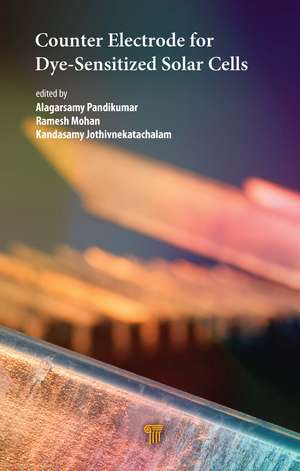Counter Electrode for Dye‐Sensitized Solar Cells
Autor Alagarsamy Pandikumar, Kandasamy Jothivnekatachalamen Limba Engleză Hardback – 25 iun 2021
Preț: 850.69 lei
Preț vechi: 1037.43 lei
-18% Nou
Puncte Express: 1276
Preț estimativ în valută:
162.79€ • 171.17$ • 134.50£
162.79€ • 171.17$ • 134.50£
Carte tipărită la comandă
Livrare economică 16-30 aprilie
Preluare comenzi: 021 569.72.76
Specificații
ISBN-13: 9789814877381
ISBN-10: 9814877387
Pagini: 278
Ilustrații: 61
Dimensiuni: 152 x 229 x 20 mm
Greutate: 0.86 kg
Ediția:1
Editura: Jenny Stanford Publishing
Colecția Jenny Stanford Publishing
ISBN-10: 9814877387
Pagini: 278
Ilustrații: 61
Dimensiuni: 152 x 229 x 20 mm
Greutate: 0.86 kg
Ediția:1
Editura: Jenny Stanford Publishing
Colecția Jenny Stanford Publishing
Public țintă
Academic, Postgraduate, and Professional Practice & DevelopmentCuprins
1. Functions of Counter Electrode and Its Characterizations 2. Metal Oxides as Counter Electrode Materials
3. Transition Metal Carbides as Counter Electrode Materials 4. Transition Metal Nitrides as Counter Electrode Materials 5. Transition Metal Sulphides as Counter Electrode Materials 6. Chalcogenides as Counter Electrode Materials 7. Carbon Nanotubes and Their Composites as Counter Electrode Materials 8. Carbon Nanofibers and Their Composites as Counter Electrode Materials 9. Quantum Dots as Counter Electrode Materials
3. Transition Metal Carbides as Counter Electrode Materials 4. Transition Metal Nitrides as Counter Electrode Materials 5. Transition Metal Sulphides as Counter Electrode Materials 6. Chalcogenides as Counter Electrode Materials 7. Carbon Nanotubes and Their Composites as Counter Electrode Materials 8. Carbon Nanofibers and Their Composites as Counter Electrode Materials 9. Quantum Dots as Counter Electrode Materials
Notă biografică
Alagarsamy Pandikumar is a scientist at the Organic and Materials Electrochemistry Division of the CSIR-Central Electrochemical Research Institute, Karaikudi, Tamil Nadu, India. He obtained his PhD in chemistry (2014) from the Madurai Kamaraj University, India, and completed his postdoctoral fellowship (2014–2016) from the University of Malaya, Malaysia, under its High Impact Research grant. He then joined the Functional Materials Division of the CSIR-Central Electrochemical Research Institute. His current research involves development of novel materials with graphene and graphitic carbon nitride, in combination with metals, metal oxides, polymers, and carbon nanotubes, for photocatalysis, photoelectrocatalysis, dye-sensitized solar cells, and electrochemical sensor applications.
Ramesh Mohan is a scientist at the CSIR-Central Electronics Engineering Research Institute, Pilani, India. He received his master’s degree in materials science (2007) as well as in engineering and polymer science and technology (2009) from Pondicherry University, India, and Anna University, India, respectively. He obtained his PhD in materials science and technology (2013) from the National Chiao Tung University, Taiwan. He was an INSPIRE Faculty-DST in the Functional Materials Division of the CSIR-Central Electrochemical Research Institute from 2016 to 2020. His research interests include organic electronics, dye-sensitized solar cells, organic–inorganic hybrid materials, and supercapacitors.
Kandasamy Jothivnekatachalam is a professor and head of the Department of Chemistry, Anna University, BIT campus, Tiruchirappalli, India. He obtained his PhD in chemistry from the University of Madras, Chennai, India. His current research focuses on photocatalysis for energy and environmental applications and his other research interests are functional materials, photocatalysis, photoelectrochemistry, photoelectrocatalysis, and dye-sensitized solar cells.
Ramesh Mohan is a scientist at the CSIR-Central Electronics Engineering Research Institute, Pilani, India. He received his master’s degree in materials science (2007) as well as in engineering and polymer science and technology (2009) from Pondicherry University, India, and Anna University, India, respectively. He obtained his PhD in materials science and technology (2013) from the National Chiao Tung University, Taiwan. He was an INSPIRE Faculty-DST in the Functional Materials Division of the CSIR-Central Electrochemical Research Institute from 2016 to 2020. His research interests include organic electronics, dye-sensitized solar cells, organic–inorganic hybrid materials, and supercapacitors.
Kandasamy Jothivnekatachalam is a professor and head of the Department of Chemistry, Anna University, BIT campus, Tiruchirappalli, India. He obtained his PhD in chemistry from the University of Madras, Chennai, India. His current research focuses on photocatalysis for energy and environmental applications and his other research interests are functional materials, photocatalysis, photoelectrochemistry, photoelectrocatalysis, and dye-sensitized solar cells.
Descriere
This book converses the various aspects of materials for the fabrication of counter electrodes, especially for dye-sensitized solar cells (DSSCs) which are believed to be the most promising in the third-generation solar photovoltaics (PVs).
